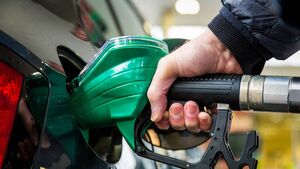Godfrey's Gospel: I think I’ll stick to the fossil fuel cars

It may not be environmentally friendly, but I like filling up at a petrol station
I DON’T drive an EV – electric vehicle – I’m too impatient to do so. I like to be able to pull up at a filling station, get a top-up of diesel and be on my way. Not very environmentally friendly, but that’s me.
That’s not to say I haven’t all the respect in the world for those who do choose to buy an EV, especially those who were first to the party, so to speak, and paid huge money for the privilege of doing so. In fact, when it comes to trading in their EV, those pioneers stand little or no chance of getting a good price, irrespective of their condition, because, as that mode of transport became more popular, the cost of buying one greatly reduced – hence a loss in trade-in value for those who were first in the queue.
I was listening to a motoring correspondent recently who said there is a lot of misinformation out there about electric vehicles and the actual mileage you can get from one. Yes, they have their limitations; yes you may have to stop and get a recharge; yes, having the heater, radio or whatever on will reduce the distance you can travel; but there are also the plus factors.
Some people simply should not purchase a 100% electric vehicle unless they do a little home preparation. In other words, having a charger at home which they diligently plug into each evening. It may sound a simple task, but you would be amazed at the number of people who continue to think in the manner of a fossil fuel motorist and say to themselves, ‘I’ll drive for as long as I can and then get a top-up’.
The reality is there is a filling station in practically every village in the country, not to mention along motorways. While charging stations are not as rare as hen’s teeth, they are still fairly rare and even if you are lucky to find one in time, the chances are that you will have to wait your turn to use one.
Then there is the whole issue of having the correct attachment â will it give you a sufficient charge to get home and so on? It’s just too much for my small brain, hence, some of us (not all) prefer to remain fossil fuel addicts.
On the question of trade-ins, my motoring correspondent also threw some light on that. Many motorists like to trade in their vehicles every three years, or sooner. It is not just about the number plate: they were brought up in an era where you were led to believe that if you keep a car longer than that, the trade-in value drops exponentially.
That is the wrong way to think if you own an EV. Remember, all it has is basically a big battery that needs less servicing than a petrol or diesel car where there are literally hundreds of parts vying for the privilege of blowing up. That means less servicing and obviously less of a need to change your vehicle for fear of the engine dying on you because of high mileage. OK, there is the whole issue of whether or not the end of life of a battery in an EV spells the end of that vehicle or not, but that is a whole other issue which, quite frankly, my simple understanding of things does not stretch to.
Economics say the purchase of a unit of electricity to run an EV is a lot cheaper than a litre of petrol or diesel. As we all know, the cost of motoring is going up by the day, and so many psychological limits have been reached when it comes to the purchase of petrol or diesel, we hardly pay any attention to the cost at the pumps now.
Once upon a time, it made national news, especially at budget time. You’d see a queue of cars outside garages as Budget Day approached in order to avoid the increase in the cost of a gallon of petrol or diesel at midnight on one of the ‘old reliables’.
There’s another thing: we seamlessly switched from gallon to litre as a method of calculating the cost of driving without a blink, even though there are only 3.7 litres in a gallon. You don’t have to be a genius to work out who won that one. It continues to remind me of decimalisation. That’s when we first really discovered the true meaning of inflation.
But back to the EV scenario. One thing I didn’t know about it is that, as of May of last year, there were 158 garda electric vehicles, many of which were sitting at super-fast points waiting for a top-up – in some cases for up to 40 minutes â instead of being out and about on patrol. Why? Because not one garda station across the country is equipped with a super-charger.
If that isn’t as joke, I don’t know what is.




